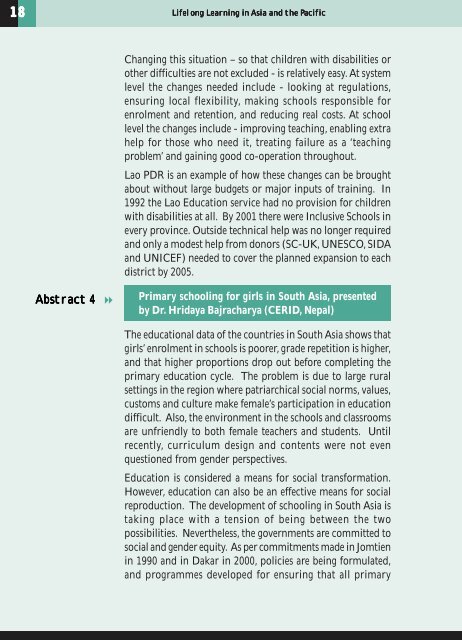Lifelong Learning in Asia and the Pacific
Lifelong Learning in Asia and the Pacific
Lifelong Learning in Asia and the Pacific
Create successful ePaper yourself
Turn your PDF publications into a flip-book with our unique Google optimized e-Paper software.
!<br />
18<br />
18 Lifelo<br />
long <strong>Learn<strong>in</strong>g</strong> <strong>in</strong> <strong>Asia</strong> <strong>and</strong> <strong>the</strong> <strong>Pacific</strong><br />
Chang<strong>in</strong>g this situation – so that children with disabilities or<br />
o<strong>the</strong>r difficulties are not excluded - is relatively easy. At system<br />
level <strong>the</strong> changes needed <strong>in</strong>clude - look<strong>in</strong>g at regulations,<br />
ensur<strong>in</strong>g local flexibility, mak<strong>in</strong>g schools responsible for<br />
enrolment <strong>and</strong> retention, <strong>and</strong> reduc<strong>in</strong>g real costs. At school<br />
level <strong>the</strong> changes <strong>in</strong>clude - improv<strong>in</strong>g teach<strong>in</strong>g, enabl<strong>in</strong>g extra<br />
help for those who need it, treat<strong>in</strong>g failure as a ‘teach<strong>in</strong>g<br />
problem’ <strong>and</strong> ga<strong>in</strong><strong>in</strong>g good co-operation throughout.<br />
Lao PDR is an example of how <strong>the</strong>se changes can be brought<br />
about without large budgets or major <strong>in</strong>puts of tra<strong>in</strong><strong>in</strong>g. In<br />
1992 <strong>the</strong> Lao Education service had no provision for children<br />
with disabilities at all. By 2001 <strong>the</strong>re were Inclusive Schools <strong>in</strong><br />
every prov<strong>in</strong>ce. Outside technical help was no longer required<br />
<strong>and</strong> only a modest help from donors (SC-UK, UNESCO, SIDA<br />
<strong>and</strong> UNICEF) needed to cover <strong>the</strong> planned expansion to each<br />
district by 2005.<br />
Abstract t 4<br />
Primary school<strong>in</strong>g for girls <strong>in</strong> South <strong>Asia</strong>, presented<br />
by Dr. Hridaya Bajracharya (CERID, Nepal)<br />
The educational data of <strong>the</strong> countries <strong>in</strong> South <strong>Asia</strong> shows that<br />
girls’ enrolment <strong>in</strong> schools is poorer, grade repetition is higher,<br />
<strong>and</strong> that higher proportions drop out before complet<strong>in</strong>g <strong>the</strong><br />
primary education cycle. The problem is due to large rural<br />
sett<strong>in</strong>gs <strong>in</strong> <strong>the</strong> region where patriarchical social norms, values,<br />
customs <strong>and</strong> culture make female’s participation <strong>in</strong> education<br />
difficult. Also, <strong>the</strong> environment <strong>in</strong> <strong>the</strong> schools <strong>and</strong> classrooms<br />
are unfriendly to both female teachers <strong>and</strong> students. Until<br />
recently, curriculum design <strong>and</strong> contents were not even<br />
questioned from gender perspectives.<br />
Education is considered a means for social transformation.<br />
However, education can also be an effective means for social<br />
reproduction. The development of school<strong>in</strong>g <strong>in</strong> South <strong>Asia</strong> is<br />
tak<strong>in</strong>g place with a tension of be<strong>in</strong>g between <strong>the</strong> two<br />
possibilities. Never<strong>the</strong>less, <strong>the</strong> governments are committed to<br />
social <strong>and</strong> gender equity. As per commitments made <strong>in</strong> Jomtien<br />
<strong>in</strong> 1990 <strong>and</strong> <strong>in</strong> Dakar <strong>in</strong> 2000, policies are be<strong>in</strong>g formulated,<br />
<strong>and</strong> programmes developed for ensur<strong>in</strong>g that all primary

















